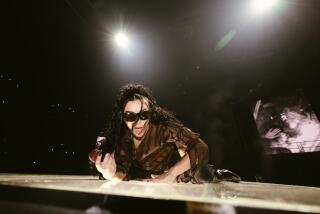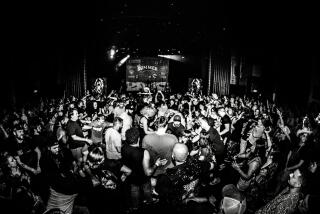At Girlschool, swashbuckling fun and a deserved jab at the Grammys
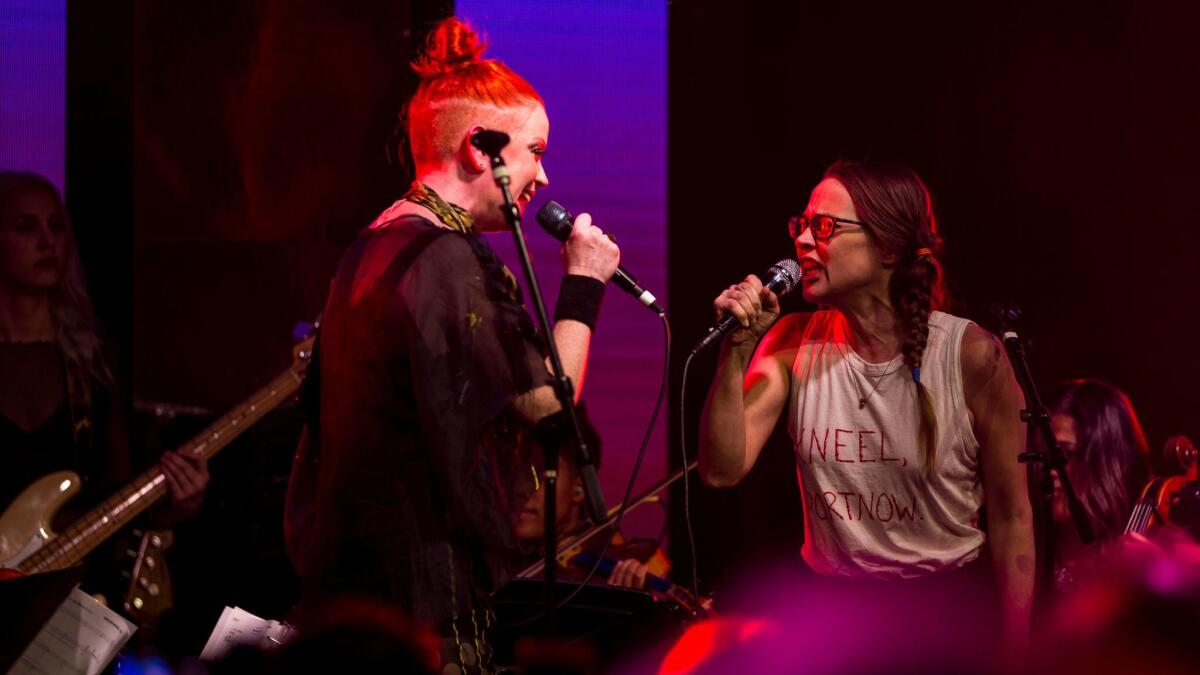
Anyone who thought that the controversy over female representation at the Grammy Awards would die down in a few days should have been at the Girlschool LA festival this weekend.
There at the Bootleg Theater, the avant-pop singer Fiona Apple walked onstage as an unannounced guest of Garbage frontwoman Shirley Manson and the all-female band and choir she’d assembled for the night. Apple wore a handwritten T-shirt with a simple, devastating pun directed at the head of the Recording Academy.
“Kneel, Portnow.”
As responses to Neil Portnow’s now-infamous “step up” comments go, it may be unbeatable. But it also perfectly embodied the swashbuckling, convivial spirit at Girlschool this year, whose mission to support women in L.A. music seems more urgent than ever.
Gender politics and #MeToo actually didn’t explicitly come up very often at Girlschool (now in its third installment and by far its biggest yet). For much of the audience, the show was a reprieve from the onslaught of bad news around sexual assault, marginalization and the undermine-y male obliviousness of comments such as Portnow’s (the Recording Academy chief has since stated those words were “not reflective” of his beliefs).
But of course, all that was the subtext for everything the festival was trying to overcome through practical, do-it-yourself means. All you had to do was listen in as Apple and Manson swapped verses on Lesley Gore’s 1963 hit “You Don’t Own Me” to hear the mission statement.
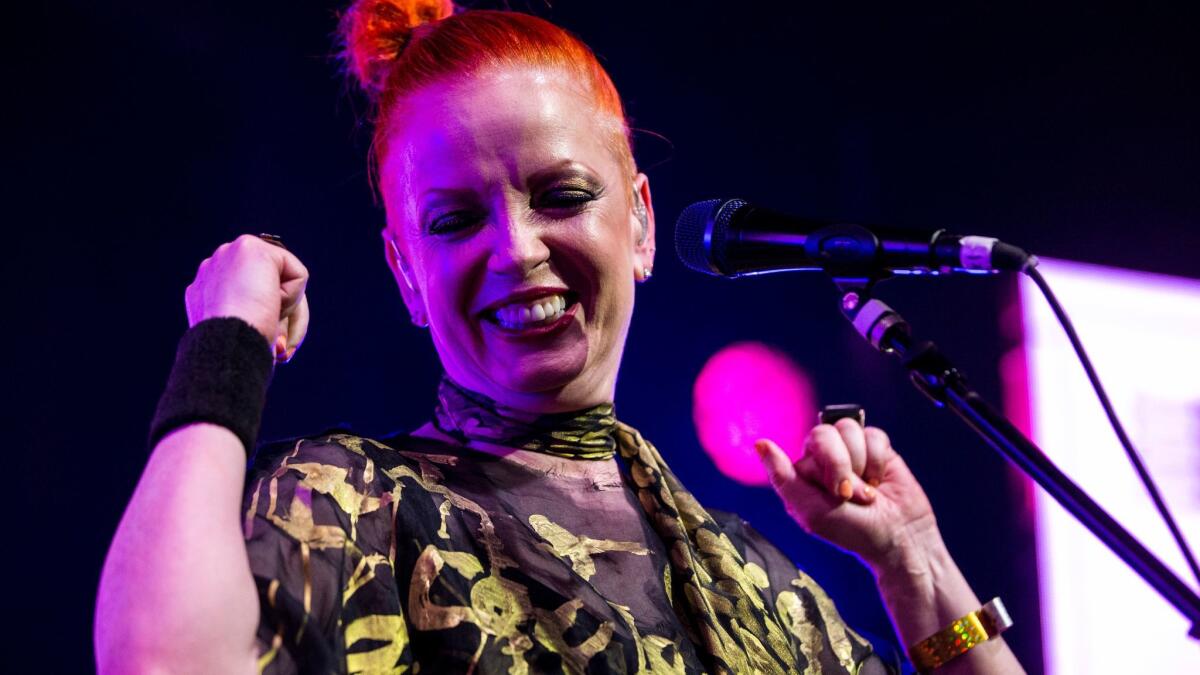
The festival was a little glimpse into an alternate universe where dudes — still welcome to attend, of course — took a backseat in every aspect of the music business, from the talent to the booking to the stage design to the marketing.
And it was indeed a friendlier, more diverse and frankly more fun vision of what concert-going should be like. Parents brought kids, women brought girlfriends and bands hung out with fans. In turn, Girlschool felt like a vision for the way forward.
The weekend launched Friday evening with a keynote from Sleater-Kinney founder and “Portlandia” actor/writer Carrie Brownstein, in conversation here with L.A.-based poet Morgan Parker.
There was a lot to get into, but the two kept their talk relatively optimistic and art-focused — and in 2018, consider this a welcome break from the daily shriek of American political life. They also admitted that movements such as #MeToo and #TimesUp can take an awful lot out of the people fighting for them as well.
“Real participation is vulnerable,” Brownstein said, of the current waves of activism in the face of so many challenges. “To not still be figuring something out is a red flag.”
“People ask me how it feels to be making people uncomfortable,” Parker added. “Well, I feel uncomfortable.”
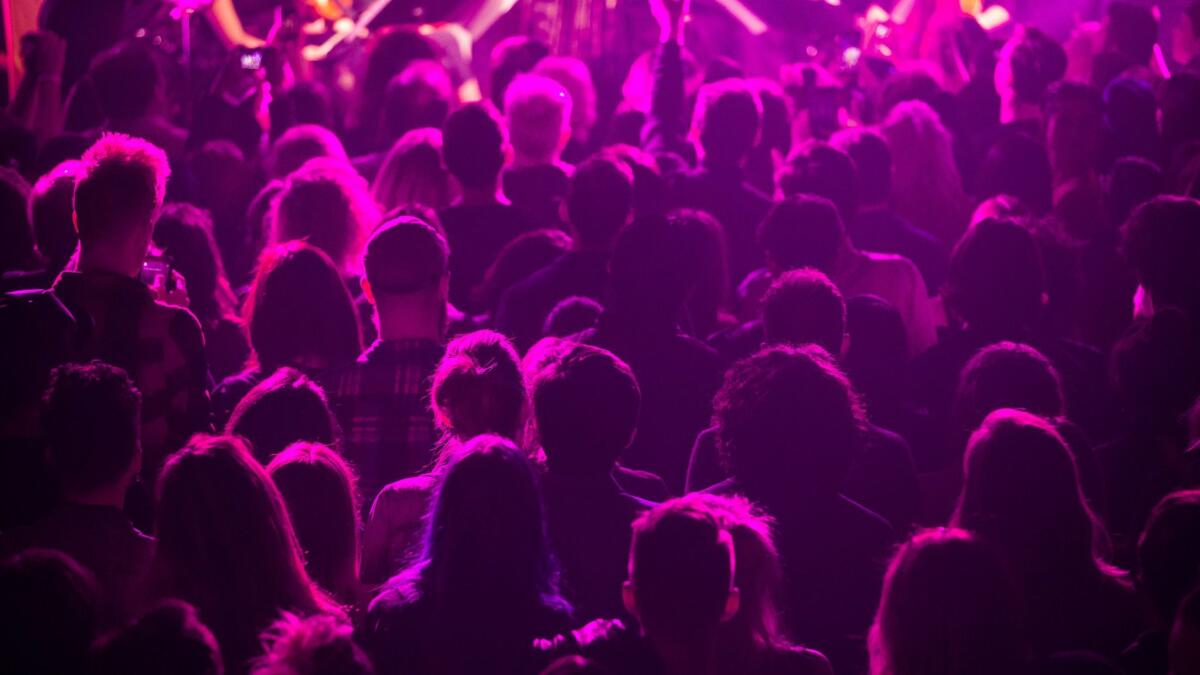
The music, in kind, was intentionally diffuse.
It ranged from the playfully antagonistic spitfire hip-hop of Desi Mo the Dogg (the act played its single “Bitch Boy” twice, to better underline the point), to the demented costumed rap-camp of Boyfriend. Girlschool also welcomed the sweet-tempered soul of Akua as well as the abstract techno of Drum and Lace, which was accompanied by two dancers locked in jittery, sexy embraces onstage. (The rest of the weekend had sets from Amber Coffman, Jay Som, Lauren Ruth Ward and many other notable artists).
But the takeaway from the weekend was probably found at Kristin Kontrol’s Friday evening set, in which Kristin Welchez was joined by a gang of preteens (and a few adults) as her backing band. Then out came Best Coast’s Bethany Cosentino and Bobb Bruno to tackle “When I’m With You” (lyrical references to spending the night together age-appropriately changed to “I hate playing alone”), and Yeah Yeah Yeahs’ Karen O to do a version of her band’s rowdy single “Date With the Night.”
It’s probably best if those kids didn’t know what was going on in the New York nightclubs where Karen first played that song, but no doubt the show possessed some of the same unhinged fun. Everyone on that stage probably went home and started a band that night, which gives us hope that the music biz, including the Grammys, will eventually be in better shape than it is today.
“You’ll want your girls to have the same crack at the world as your sons,” Manson said the following night. For three days at Girlschool, everyone got to have it.
More to Read
The biggest entertainment stories
Get our big stories about Hollywood, film, television, music, arts, culture and more right in your inbox as soon as they publish.
You may occasionally receive promotional content from the Los Angeles Times.
